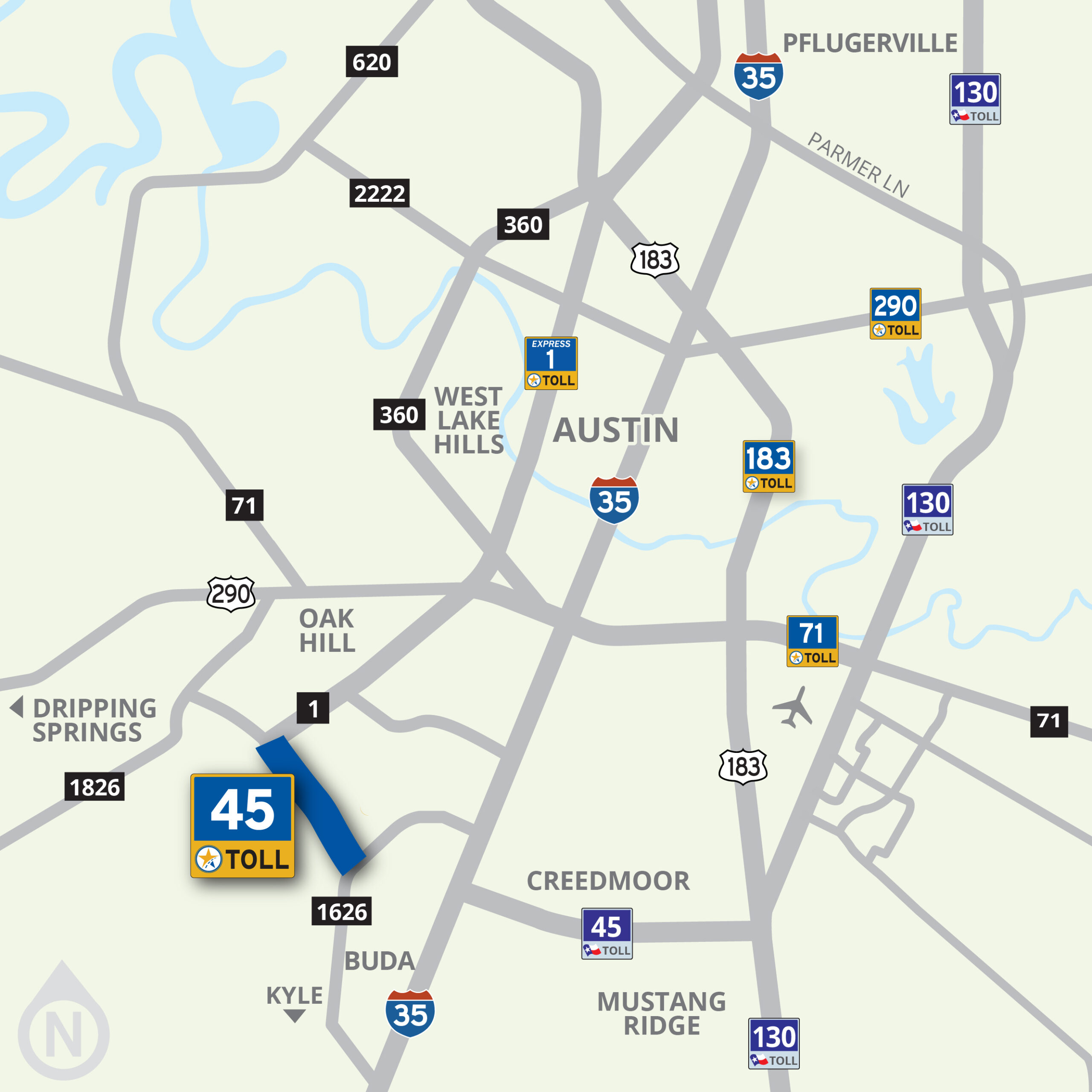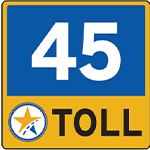45SW Toll
A 3.6-mile toll road connecting State Loop 1 (MoPac) and FM 1626 in southern Travis and northern Hays county
Drivers who choose to use 45SW Toll may save as much as 9 – 17 minutes over driving local routes to reach Central Austin. Because of this important new connection, even those that continue to use the non-tolled alternatives will still enjoy a time savings of as much as 6 – 7 minutes.

See additional information on 45SW Toll History and Location.
Use Your Electronic Tag or Drive on Through, We’ll Bill You
45SW Toll is completely automated with no need to stop or even slow down.
The choice is yours – utilize the all-electronic, or cashless, tolling method of payment through an electronic tag account; or if you don’t have an electronic tag just keep moving and we’ll bill you through the Pay By Mail program.
In Texas, there are multiple transportation agencies that are authorized to operate toll roads, issue their own electronic tag, and do their own billing. In the Austin area, there are two: the Texas Department of Transportation (TxDOT) and the Central Texas Regional Mobility Authority (Mobility Authority).
Mobility Authority customers can pay their tolls with a TollTag, EZ TAG, Fuego Tag, K-TAG, Pikepass, SunPass, E-470’s ExpressToll or Bancpass (the Mobility Authority also accepts TxTAG which is now operated by HCTRA) and get a 33% discount, or they can choose to Pay By Mail. Pay By Mail customers are billed using a picture of their license plate, and are charged a $1.00 statement fee per bill. Vehicle registration information must be up to date in order for the bill to be sent to the correct address. Pay By Mail is available on all toll roads in Central Texas, although you may receive separate bills depending on which agency operates the road you traveled on.
To learn about paying your tolls, see the download available below.
45SW Toll: 2025 Rates
 |
2 Axle | 3 Axle | 4 Axle | 5 Axle | 6 Axle | |||||
|---|---|---|---|---|---|---|---|---|---|---|
| TxTag | Pay by Mail | TxTag | Pay by Mail | TxTag | Pay by Mail | TxTag | Pay by Mail | TxTag | Pay by Mail | |
| Bear Creek Mainline Plaza | $1.22 | $1.83 | $2.44 | $3.66 | $3.66 | $5.49 | $4.88 | $7.32 | $6.10 | $9.15 |
Learn About the 45SW Toll
Want more information fast? Download the fact sheet below.
Project Need: As a result of growth and development, drivers have been using local roads, such as Manchaca Road, Slaughter Lane and Brodie Lane as commuter corridors to access MoPac and downtown Austin. These local roads have been increasingly congested, with signalized intersections exacerbating the traffic problem. Some neighbors also express concerns about cut-through traffic and the inability to safely exit their neighborhoods.
Environmental Study: The Texas Department of Transportation (TxDOT) launched an environmental study in June 2013 to study a possible solution for improving mobility in the rapidly growing area of northern Hays and southern Travis counties. This study identified the construction of 45SW, a new four-lane toll road on existing state-owned right-of-way form MoPac to FM 1626, as the recommended action.
During that study, a comprehensive document, called an Environmental Impact Statement (EIS), was developed to fully evaluate and disclose the potential impacts of the project. In July 2014, this document was presented to the public for review and comment. The document was later submitted for state review and an environmental decision on the project. On March 5, 2015, TxDOT issued a Record of Decision (ROD) which allowed the SH 45SW project to proceed to final design and construction, with specific commitments to protect the environment during its construction and operation.
In July 2016, the contract for SH 45SW construction was provisionally awarded to McCarthy Building Companies followed by an issuance of Notice to Proceed in October 2016. Construction on SH 45SW officially commenced in November 2016. The road opened on June 1, 2019.
Environmental Protection: Due to the environmentally sensitive nature of the Edwards Aquifer Recharge Zone, a number or measures were implemented to protect the surrounding environment.
Best Management Practices (BMP) for Water Quality: The following BMPs were used to manage the quantity and improve the quality of stormwater runoff with the goal of reducing contaminants collected by stormwater as it moves into streams and rivers:
- Permeable Friction Course (PFC): PFC was used throughout the SH 45SW Project. PFC is a porous roadway surface used as an overlay on top of a conventional roadway surface. PFC comes with many benefits, including its ability to reduce water spray which improves visibility and safety.
- Water quality ponds: Water quality ponds provide stormwater control by retaining and treating stormwater runoff. The ponds’ physical, biological and chemical processes work to remove pollutants, particulates, organic matter and metals before water is released into the environment.
- Vegetative controls: In addition, grassy swales planned for inclusion on SH 45SW work to channel and treat stormwater runoff. Vegetation decreases the speed at which the runoff moves to enable absorption into the soil, which acts as a natural filter.
- Linear sections of land called Vegetative Filter Strips were installed along sections of the project to act as a buffer between the project and the protected areas around it. Strips work similarly to swales by slowing runoff and filtering it through plants, roots and soil.
- Hazardous materials traps: Hazardous materials traps are located at all stormwater discharge points (or outfalls) to creeks and waterways to prevent the accidental release of hazardous materials into a waterway.
- Phased construction
- No use of herbicide
- Containment area for fuel and hazardous material storage
- Minimum 200-foot fueling buffer from nearest sensitive karst feature and water crossing
Environmental Protections for Vegetation: Several measures were put into place to ensure that the project minimized long-term impacts to vegetation and wildlife, including:
- Temporarily disturbed areas were restored and seeded using a native seed mix
- Construction staging avoided impacts to active nests of migratory birds included in the U.S. Fish and Wildlife Service list of migratory birds
- Vegetation clearing occurred only outside of nesting season
- Other measures were taken to avoid impacts to migratory birds including the removal of inactive nests prior to breeding season
Protecting Endangered Species: The project area was surveyed to determine if any threatened or endangered species would be impacted by the project. The results of this evaluation are below:
- Golden-cheeked warbler: None identified, and no habitat known to be used by the species is present within the right-of-way.
- Karst Invertebrates: SH 45SW lies outside of the known ranges of all endangered karst invertebrates. Karst invertebrates are beetles, spiders and scorpion-like animals that are specially adapted to living underground. They typically spend their entire lives in caves.
- Salamanders: No habitat for the endangered Austin Blind or Barton Springs Salamanders is present within or adjacent to project right-of-way. SH 45SW achieved a highway runoff total suspended solids (TSS) removal rate of at least 90 percent (10 percent higher than required by the Texas Commission on Environmental Quality) to protect potential salamander habitats downstream from the project.
- Other Endangered Species: No habitat for the endangered Black-capped Vireo is present in the right-of-way. The Texas Horned Lizard is scarce in the area, and no highly suitable habitat for the Lizard is present in the right-of-way.
- Wildlife Movement Corridors: The bridge at Bear Creek utilizes a wide-span structure that allows for safe and dry wildlife movement and preservation of native vegetation under the bridge.
Bicycle & Pedestrian Facilities. 45SW Toll includes a 10-foot-wide, 4.5-mile long shared use path on the south side of the road from FM 1626 to MoPac and Escarpment Blvd. The bicycle and pedestrian facility includes an overlook at Bear Creek and will connect to the future Violet Crown Trail.
Publications and Resources
For more information review the downloads below.
-
01.
-
02.